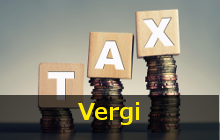
Crypto-asset regulation and its impact on tax
Abdulkadir Kahraman
The bill of law to amend the Capital Markets Law (“CML”) regarding crypto-assets was submitted to the Speaker of the Turkish Grand National Assembly on May 16, 2024. It is mentioned in its justification that although there is no clear regulation on crypto-assets since their emergence in many jurisdictions including Türkiye, there is an effort to create a common set of applications by international organizations.
According to the bill of law, definitions regarding crypto-assets are included among the definitions in the Capital Markets Law and the Capital Markets Board ("Board") is designated as the regulatory institution. The bill of law defines “crypto-assets as intangible assets that can be created and stored electronically using distributed ledger technology or similar technology, distributed over digital networks, and capable of representing value or rights.” The bill of law gives the Board broad powers to make secondary regulations. Regulations regarding different classes of crypto-assets (such as asset-backed crypto-assets, e-money crypto-assets and NFTs) are left to the secondary regulations of the Board.
Crypto-asset providers and licensing
According to the bill of law, crypto-asset service providers must obtain a license from the Board in order to be established and operate. Existing platforms must submit their applications to the Board within a month after the bill becomes law and enters into force, otherwise, they have to start the liquidation process within three months. Details of the application to be made to the Board will be announced by the Board in the secondary legislation.
Taxation of cryto-assets
Approach of jurisdictions towards crypto-assets varies according to OECD publications:
| Intangible Assets | Financial instrument or asset | Commodity or virtual commodity | Money | Legal payment instrument |
| Australia, France, Chile, Czech Republic, Luxembourg, Nigeria, Spain, Sweden Switzerland* and the United Kingdom | Argentina**, Brazil, Croatia, Denmark, Israel, Japan, Slovak Republic and South Africa | Austria, Canada, China and Indonesia | Belgium, Ivory Coast, Italy and Poland | Japan |
* Goods for those who buy and sell these assets
** There is no exact definition, but in terms of income tax application
Although the definition of crypto-assets varies from country to country, "crypto-assets" are defined as "intangible assets" in the bill of Law in the Turkish Grand National Assembly. This definition has historical importance in terms of tax legislation and will be included in Turkish tax legislation accordingly. Indirect and direct tax laws will be designed according to this definition. However, not making a clear definition of crypto-assets in the Law and to make such definition according to secondary legislation may lead to difficulties in terms of taxation.
This is the summary of the article published in the Ekonomist magazine’s issue 2024/11, dated 26.05.2024.
Explanations in this article reflect the writer's personal view on the matter. EY and/or Kuzey YMM ve Bağımsız Denetim A.Ş. disclaim any responsibility in respect of the information and explanations in the article. Please be advised to first receive professional assistance from the related experts before initiating an application regarding a specific matter, since the legislation is changed frequently and is open to different interpretations.










 Başa Dön
Başa Dön